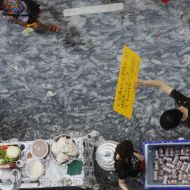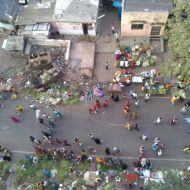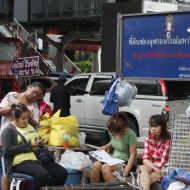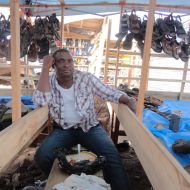In a City Desperate for Water, Tanker Drivers Hold All the Cards
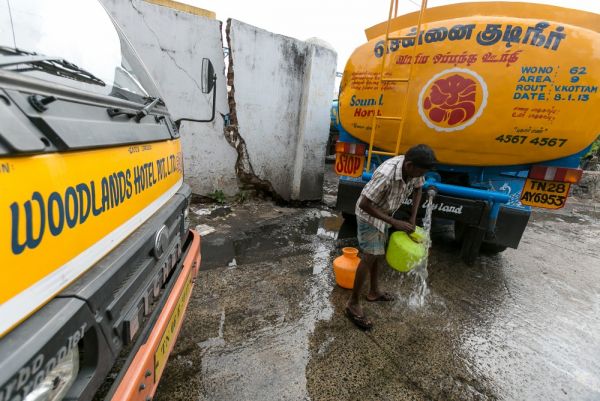
In parts of Chennai, water delivered by tanker trucks is the only option residents have. Photo credit: Amar Ramesh
For three days late last month, 400 water-tanker lorries lined up on either side of the Thoraipakkam-Pallavaram Radial Road as cars, buses, motorbikes and trucks whizzed past on the link connecting Old Mahabalipuram Road (OMR), also known as the IT Corridor, and GST Road to the airport. The tanker operators were on a flash strike, protesting their pumping sets being impounded by a government official.
The yellow, green and blue tankers stood stolidly by the road in the shadow of the tall, glass-fronted buildings in the southern suburbs to which they supply water every day. Thousands of families living on OMR and Pallikaranai were left high and dry after the 400 private water tankers — the sole suppliers of water to the southern parts of the city — went on strike. Most companies and apartment blocks along OMR do not have water connections from the government.
In September 2011, the Chennai corporation city limits were expanded from 176 to 426 square kilometers by annexing 42 local bodies adjoining the city. Many of the newly added areas are among the fastest growing, fueled by jobs on the IT Corridor, where a number of information technology and multinational firms have offices. Alongside the offices, high-rise apartment complexes are springing up to house the many workers from across the state and country.
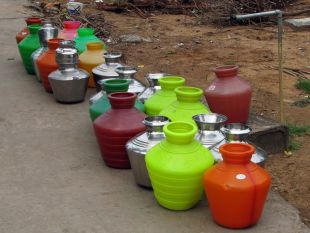
Jugs at a water pump waiting to be filled. For people without a water connection in their home, such containers are a lifeline. Photo credit: McKay Savage via Flickr Creative Commons
“We are in the process of laying pipelines in added areas, but it will take time,” said a senior official at Metrowater, the city’s water utility. Until then, private water-tanker operators are taking advantage of the gap in the system.
Private tankers operate with their own set of rules, and a union decides the prices for a load of water. Metrowater charges Rs 600 for 9,000 liters of water, while private tankers charge between Rs 1,500 and Rs 3,000.
Residents of villages on the outskirts of Chennai, areas such as Ambattur, Medavakkam and Madhavaram, from where the tanker owners and operators draw water, say the tankers are depleting their ground water. The tankers supply water to all the IT and ITES companies located along OMR and in Sholinganallur, Guindy and Ambattur Industrial Estate.
“The private water tankers indiscriminately draw water from our wells. We used to find water 15 meters below the ground, but now we have to dig 200 meters to get water,” said E Ganeshan, who has been living in Semmencherry for 12 years. “The government needs to bring in a law to regularize extraction.”
Last week’s strike followed the seizing of a tanker and pump sets by an administration officer of Sholinganallur, in the south of the city. Residents of Otiambakkam, a village in Sholinganallur, had complained about tankers drawing water illegally from their land. The official acted, and the tanker operators reacted. After a three-day standoff, during which some companies told employees to stay away from work because they hadn’t enough water to keep offices working, the government blinked.
“We called off our strike after the government said we would not be harassed for tapping groundwater illegally. We were asked to apply for permission to draw water from licensed borewells,” said P S Sundaram, president of Chennai Private Water Tanker Lorries Association. Revenue department officials held a meeting with private tankers’ associations and assured them that steps would be taken to regularize the tapping of groundwater.
While the strike may have ended with the government – as always – promising to “look into the matter” and “regularize norms for extraction of groundwater,” it highlighted the desperate situation the city is in. Tanker operators have always managed to arm-twist the government since the demand for water in this rapidly expanding city is far higher than the supply. Metrowater, the government agency that supplies water to the city, has cut its daily supply to households and commercial establishments by 27 percent following a failed monsoon and a punishing summer. The city’s four reservoirs are 86 percent empty. Tanker operators have plenty to smile about.

